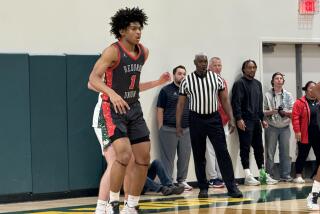Decision in Ocean View Hearing Is Due Thursday
- Share via
The fate of the Ocean View High School boys’ basketball team will be decided Thursday when Judge Harmon G. Scoville rules on Seahawk Coach Jim Harris’ petition to have sanctions barring his team from the CIF Southern Section 5-A playoffs overturned.
Scoville on Monday listened to 80 minutes of testimony by lawyers on behalf of Harris and the CIF at a hearing in Orange County Superior Court, and then announced he would make a ruling at 10 a.m. Thursday.
The CIF ruled the Seahawks ineligible for the 1985-86 playoffs for violating CIF Rule 510 (undue influence) in the retention of Lynwood transfers Ricky Butler and Desi Hazely at Ocean View in the summer of 1984.
John Myers, Ocean View principal, had forfeited the Seahawks’ 24 wins and Sunset League championship in March, 1985, after a Huntington Beach Union High School District investigation revealed a Rule 510 violation.
The Southern Section Executive Committee, however, voted to impose stiffer penalties in August when it decided that the school’s sanctions were not strong enough.
Much of Monday’s hearing focused on the undue influence rule as interpreted by the Southern Section, and whether the section abused its discretion by imposing the sanctions on Ocean View.
Attorney Ray Alvarado, representing Harris, argued that Rule 510 is vague and that, throughout previous appeals to the Southern Section and State CIF, no one addressed the intent and purpose of the rule. Alvarado saids that Harris never broke the intent of the rule. He also said that the rule does not deal with the retention of students.
Attorney Andrew Patterson, representing the CIF, argued that Rule 510 deals specifically with the retention of students.
Patterson read directly from the bylaw, which states: “The use of undue influence by any person or persons to secure or retain a student or to secure or retain one or both parents or guardians of a student as residents may cause the student to be ineligible for high school athletics for a period of one year. . . . “
Alvarado countered Patterson by noting that section 510.2 of the undue influence rule states: “The object of the recruiting rule is to assure that the student athlete is making a free and unpressured choice of his or her high school.”
Butler and Hazely arrived at Ocean View in the summer of 1983 under the care of guardian Laurant Brown. When Brown decided to move to La Crescenta in the summer of 1984, the boys and their parents, according to Harris, approached the coach about becoming their guardian so they could remain at Ocean View.
Harris agreed to become the boys’ guardian but had to obtain an inter-district transfer from the Saddleback Valley Unified School District for them to be eligible at Ocean View while living in his El Toro home.
Harris’ attorneys said he did not impede the free choice of the students to remain at Ocean View. Therefore, they say, he did not break the intent of the rule.
“Nobody ever asked the parents or the boys whether they were unduely influenced,” Alvarado said. “They wanted to remain at Ocean View.”
Patterson argued that Harris intentionally falsified the address of Butler and Hazely in the summer of 1984 in an effort to register them at Ocean View.
By taking over the entire process of obtaining an inter-district transfer and enrolling the boys in classes, Patterson said, Harris sheltered the parents and students from those who might give them contrary advice.
“Coach Harris, not the family, began the process of obtaining the transfers,” Patterson said. “There are counselors and registrars to take care of those things. When you have a coach who does all those things, when records are deliberately falsified, then the entire system has been thwarted.”
Harris’ attorneys also argued that the Southern Section sanctions were excessive--that all 12 of the players on this year’s team are eligible and should be allowed to compete in the playoffs.
But Patterson, in defense, argued that the self-imposed sanctions by the school and district were not strong enough because they occurred after a season in which two ineligible players were allowed to play 28 games and the program was allowed to reap financial benefits. Therefore, Patterson said, the CIF did not abuse its discretion.
“The truth is that Ocean View, with two ineligible players, went to the (5-A) finals and had the benefits of financial proceeds up to the final game in the Long Beach Arena,” Patterson said.
“What Ocean View is saying is, ‘We’ll forfeit the past but don’t penalize the future.’ Last year, there were a number of schools knocked out of the playoffs by a team (Ocean View) with two ineligible players. I’m sure they would have loved to have continued in the tournament, too.
“The fact that Ocean View cannot participate in the playoffs is a consequence, and not a pleasant one, but that doesn’t mean life is unfair.”
Early in the hearing, the question of whether extra-curricular activities are a right or a privilege arose, but Scoville never resolved the issue, deciding instead to proceed with the hearing.
Times Staff Writer Mike DiGiovanna also contributed to this story.
More to Read
Get our high school sports newsletter
Prep Rally is devoted to the SoCal high school sports experience, bringing you scores, stories and a behind-the-scenes look at what makes prep sports so popular.
You may occasionally receive promotional content from the Los Angeles Times.






